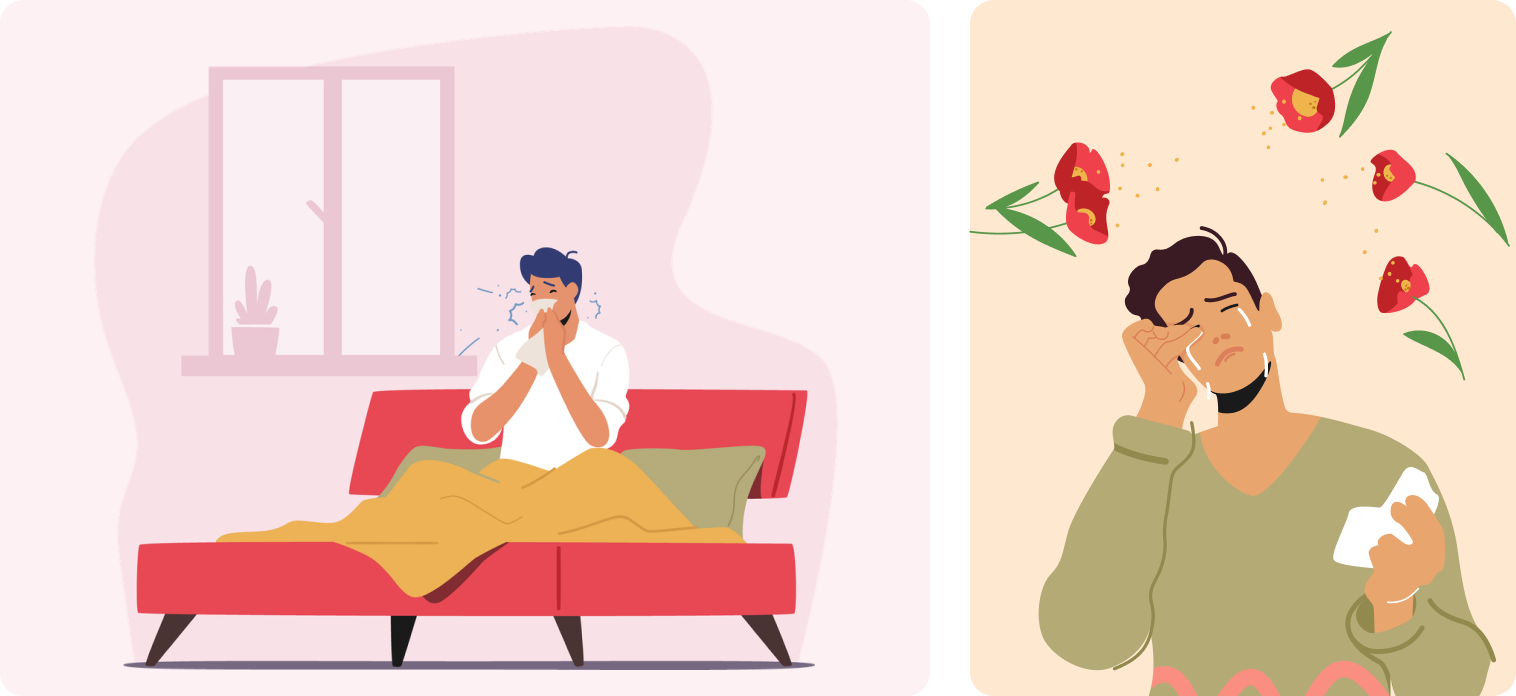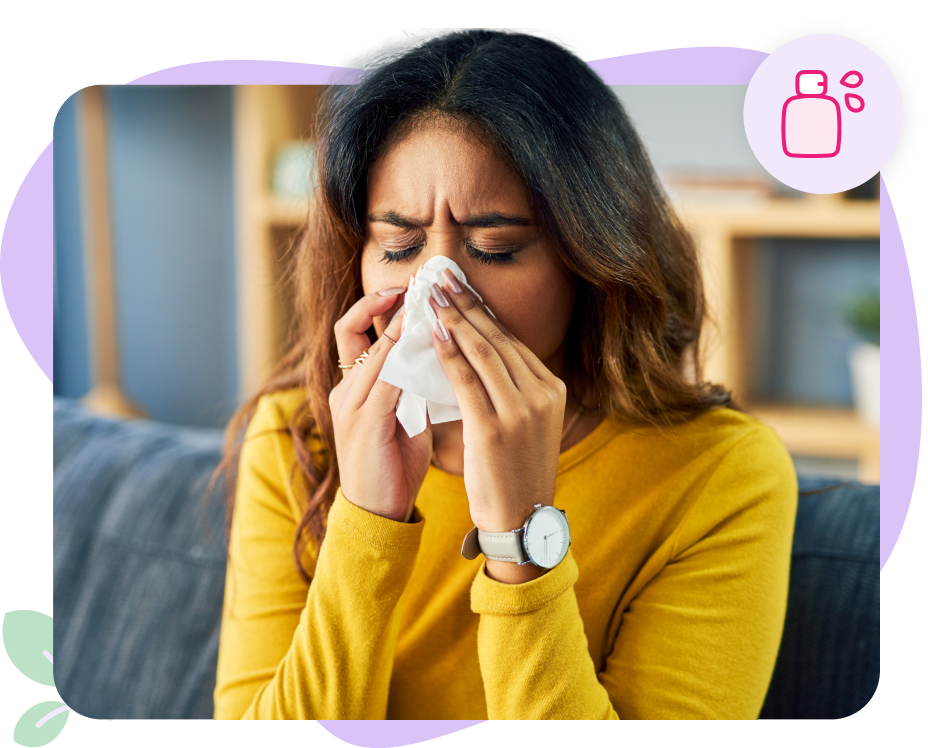Overview
What is hay fever?
Hay fever, clinically known as Allergic rhinitis, is a common allergy that causes swelling in your nose (nasal passages). This happens because of an allergic reaction. Your body’s immune system reacts to allergens in your environment. These are things like pollen dust, dust mites, mould, or animal dander. Hay fever causes cold-like symptoms, such as sneezing, itching, a runny or stuffy nose, and watery eyes.
Who gets hay fever?
Both children and adults can have hay fever. In the UK, 10 to 15% of children between the ages of 6 and 14 and 26% of adults get it. In Western Europe, the number of people with hay fever has greatly increased over the years, and it negatively affects the quality of people’s lives. It affects their productivity and the money they spend in the healthcare system. In the European Union, the costs of allergic rhinitis to society are often ignored. For example, the impact of hay fever on work productivity is estimated to cost €30 billion to €50 billion per year.

Types
Seasonal hay fever
Seasonal allergies, what you are most likely referring to when you talk about having hay fever, occur in response to allergens that are present during specific times of the year, like pollen from trees, grasses, and weeds in the spring or summer.
Year-round (perennial) hay fever
Perennial allergies, on the other hand, happen year-round in response to allergens that are present indoors, like dust mites or pet dander.
Causes
Hay fever occurs because the body’s immune system reacts to allergens, tiny particles such as pollen from trees, grasses, and weeds. The first time you breathe in an allergen, you will not have an allergic reaction. This phase is called sensitization. However, once your immune system is sensitized, it will make antibodies the next time you breathe in these allergens. These are special proteins in the body that memorize what the allergen looks like so that it can fight it off. When this happens, your body releases histamine and other chemicals, which cause swelling and irritation in your nose and lead to symptoms like sneezing, watery eyes, a runny nose, and itching.
Genetics play a role in the likelihood of developing allergic rhinitis. If allergic rhinitis runs in your family, you could have a higher chance of developing it. Allergic rhinitis can be more or less severe. It depends on your body’s reaction to the allergens. In addition to a family history of allergic rhinitis, below is a list of other risk factors that may also increase your chances of having allergic rhinitis:
- Being the firstborn in your family
- Using a lot of antibiotics early on in your life
- Being male
- Being born during the pollen season
- Being exposed to indoor allergens, such as dust mites or smoking early on in your life
Diagnosis & Symptoms
Hay fever is often diagnosed based on clinical symptoms. This means your doctor checks to see if you have hay fever based on the history of your symptoms and on how often they occur and how much they affect your daily lifestyle.
Having 2 or more of the following symptoms for more than one hour per day usually means you have hay fever: itching, running or blocked nose, or sneezing. Your doctor will also examine the inside and outside of your nose to see if there is swelling.
Hay fever symptoms are often confused with the common cold. Because of this, you may be unaware that you have the condition. If your doctor is unable to confirm your diagnosis of hay fever or needs more information about the type of allergen causing your symptoms, he or she will recommend additional testing and/or a referral to an allergy specialist. Additional testing includes blood tests to see if your body has antibodies to specific allergens. Your doctor may also order a skin-prick test. This test uses a small needle to place a tiny amount of the allergen on your skin to see if your body has a small reaction at that location. This can help your doctor figure out what is causing your symptoms.
The most common symptoms of allergic rhinitis are:
- Sneezing
- Runny nose
- Nasal Congestion
- Itching in the eyes and nose
- Mucous in the throat
- Watery eyes
- Headaches
- Tiredness
Treatment & Management
Treatment and management of allergic rhinitis include educating patients, avoiding potential allergens, and taking medications. Determining the cause of the allergic rhinitis, whether it is more seasonal (hay fever) or year-round, can also help narrow down possible allergens. Avoiding allergens can help your symptoms, but you also don’t want to isolate yourself from enjoyable activities or from friends and family. Because of this, a combination of medications and some lifestyle changes tends to be the most effective approach. There are both over-the-counter and prescription medications to help relieve your symptoms. It is important for you to use your medications regularly to get the maximum benefit possible.
Allergens to avoid
- House dust mites, which feed on dead skin flakes and are found in things like mattresses and carpets
- Pollen from trees and grasses during spring and early summer, as well as spores from molds and fungi
- Animals like cats and dogs can trigger allergies in some people due to flakes of dead skin, urine, and saliva
- Other work-related allergens such as wood dust, flour dust or latex
If your allergic rhinitis is mild, you may be able to obtain relief from a saline nasal rinse. This is done using a product such as Neil Med Sinus Rinse. It can help relieve congestion in your nose. If this is not enough, you may need some stronger medications.
Some people only require one type of medication, but if your symptoms are worse, you could be on more than one type of medication. The two most common types of medications used for allergic rhinitis are antihistamines and steroid nasal sprays nasal. Read the next section for a full list of medication options, and remember to always refer to the patient information leaflet for more information about any medication you use.
Medications
Antihistamines
Hay fever causes the release of histamine in your body. Antihistamines are medications that work to block the effects of histamine. If you take them before coming into contact with an allergen, you can prevent some of the common symptoms. Some antihistamines can make you sleepy, such as promethazine, chlorphenamine, cinnarizine, hydroxyzine, and diphenhydramine. Antihistamines that are less likely to make you sleepy include acrivastine, cetirizine, fexofenadine, and loratadine. It is usually better to take non-drowsy antihistamines, as they have fewer side effects.
Antihistamines are available as oral tablets, eye drops, nasal sprays, and creams or lotions, depending on the specific medication. If your symptoms are only in your eyes or nose, then there are antihistamines that are available as eye drops and nasal sprays. One advantage of using oral antihistamines is that the dosing is convenient. These medications are only taken once per day. Side effects of antihistamines can vary based on each person, but the most common side effects of non-drowsy antihistamines are:
- Headache
- Dry mouth
- Feeling sick
- Drowsiness (this is less common with the non-drowsy antihistamines)
You can find out more information about antihistamines and their side effects in the patient information leaflet for the specific medication you are taking. It is important to talk with your pharmacist to narrow down options that are best for you.
Steroid nasal sprays
Steroid nasal sprays are usually used for patients who have very frequent symptoms that are difficult to manage. These medications work by reducing swelling. They can be used with antihistamines or on their own. These medications are better at lessening the symptoms of allergic rhinitis or hay fever, but they can take several days to begin working. The most common steroid nasal sprays are:
The most common side effects include irritation and stinging of your nose, an unpleasant taste in your mouth, a dry throat sensation, and sometimes nose bleeds. Steroid nasal sprays are not absorbed into your body in the same way as oral steroids. If you have been using these medications for a long time or too often, it is important to check with your pharmacist to make sure you are on the best medications. Combining steroid nasal sprays with antihistamines will better control your symptoms than either alone. Also, make sure to ask your pharmacist about the proper way to use nasal sprays because proper use can help prevent some of these common side effects.
Decongestants
Decongestants like Sudafed, which comes in an oral tablet, and can be beneficial in clearing up congestion in your nose. This medication is good for short-term or quick relief because if you use it too long, your congestion can get worse when you stop. They are not considered the best options to use at first because they have more side effects. Also, some people are not able to use these medications if they have a history of a specific type of heart problem. Talk to your doctor or pharmacist to make sure it is a safe option for you
Allergen-specific immunotherapy (usually allergy shots)
If all of the first-option medications do not work and your symptoms are very bad, then your doctor may refer you to an allergy specialist to receive special allergy shots. This is usually done after all of the other medication options have failed.
FAQs
How do I treat my hay fever (allergic rhinitis)?
Talk to your pharmacist or doctor about medication and lifestyle options to help you relieve your symptoms. The most common treatment options are:
- Saline nose rinse
- Antihistamines
- Steroid Nasal Sprays
- Decongestants
What is the main cause of hay fever (allergic rhinitis)?
Allergic rhinitis is an allergic response in your nose (nasal passage) to allergens. Allergic responses cause swelling and congestion in your nose. This can be bothersome and make it hard to live a comfortable lifestyle. Allergens are particles that your body reacts to, and common ones are mould, dust mites, and pollen from grass or trees.
What is hay-fever (allergic rhinitis)?
Hay fever is a term used to describe allergic rhinitis that happens only in certain seasons. For example, there tends to be more pollen in the air during the spring or summer. This type of seasonal allergic rhinitis is called “hay fever.” There is no fever that occurs with this type of allergic rhinitis. The other type of allergic rhinitis is one that happens all year. This is called perennial allergic rhinitis.
References
1. Bousquet J, Anto JM, Bachert C, et al. Allergic rhinitis. Nature Reviews Disease Primers. 2020;6(1):95. doi:10.1038/s41572-020-00227-0
2. Frew AJ. Advances in environmental and occupational diseases 2003. J Allergy Clin Immunol. 2004;113(6):1161-6. doi:10.1016/j.jaci.2004.03.039
3. Matheson MC, Dharmage SC, Abramson MJ, et al. Early-life risk factors and incidence of rhinitis: results from the European Community Respiratory Health Study–an international population-based cohort study. J Allergy Clin Immunol. 2011;128(4):816-823.e5. doi:10.1016/j.jaci.2011.05.039
4. Nur Husna SM, Tan HT, Md Shukri N, Mohd Ashari NS, Wong KK. Allergic Rhinitis: A Clinical and Pathophysiological Overview. Front Med (Lausanne). 2022;9:874114. doi:10.3389/fmed.2022.874114
5. Saulyte J, Regueira C, Montes-Martínez A, Khudyakov P, Takkouche B. Active or passive exposure to tobacco smoking and allergic rhinitis, allergic dermatitis, and food allergy in adults and children: a systematic review and meta-analysis. PLoS Med. 2014;11(3):e1001611. doi:10.1371/journal.pmed.1001611
6. Scadding GK, Kariyawasam HH, Scadding G, et al. BSACI guideline for the diagnosis and management of allergic and non-allergic rhinitis (Revised Edition 2017; First edition 2007). Clin Exp Allergy. 2017;47(7):856-889. doi:10.1111/cea.12953
7. Seidman MD, Gurgel RK, Lin SY, et al. Clinical Practice Guideline:Allergic Rhinitis. Otolaryngology–Head and Neck Surgery. 2015;152(1_suppl):S1-S43. doi:10.1177/0194599814561600
8. Small P, Keith PK, Kim H. Allergic rhinitis. Allergy Asthma Clin Immunol. 2018;14(Suppl 2):51. doi:10.1186/s13223-018-0280-7
9. Tenero L, Vaia R, Ferrante G, et al. Diagnosis and Management of Allergic Rhinitis in Asthmatic Children. J Asthma Allergy. 2023;16:45-57. doi:10.2147/jaa.S281439
10. National Health Service (NHS). Allergic Rhinitis. February 10, 2023. Accessed 04/17/23.https://www.nhsinform.scot/illnesses-and-conditions/ears-nose-and-throat/allergic-rhinitis


















